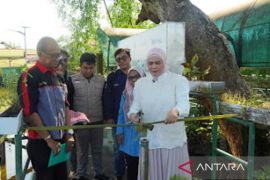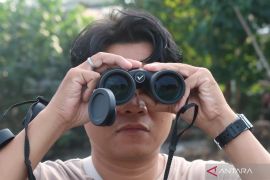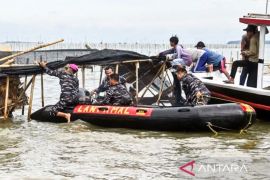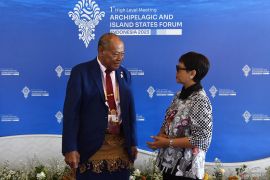"Indonesia has technical cooperation program to assist other developing nations as we have large assets and experiences in developing eco-tourism," Director General for Information and Public Diplomacy at the Foreign Ministry Andri Hadi said recently.
The foreign affaris ministry is organizing an international training course on eco-tourism for the Pacific from April 25 to May 4, 2011 in Yogyakarta. Earlier, also in Yogyakarta, on April 27-8, an international conference on eco-tourism was held for South Pacific countries.
The ecotourism training course held by the ministry in cooperation with the Yogyakarta-based Gadjah Mada University (UGM) is being participated in by 10 South Pacific countries, namely Malaysia, Fiji, Samoa, Marshal Island, Solomon, Vanuatu, Tuvalu, Tonga, Papua News Guinea, and Timor Leste.
The two event were conducted in response to the United Nations` appeal regarding the UN Millennium Development Goals (MDGs), the director general.
The UN had called for ecotourism development as one of the mechanisms to lower the poverty rate and promote environmental preservation within the framework of the MDG, he explained.
As a donor country, Indonesia has played a role in the area of capacity building and technical cooperation diplomacy by helping other developing states.
"The assistance is given to developing countries in the South Pacific countries to develop their ecotourism as well as to deal with climate change," he said.
Yogyakarta has been chosen to host the training because it has a center for ecotourism studies.
Among the speakers at the conference were former tourism and culture minister I Gde Ardika and Executive Secretary of the University of Gadjah Mada Djoko Moerdiyanto who talked about climate change and its impact on the tourism industry.
Apart from the training course and conference, the University of Gadjah Madah`s Tourism Study Center (UGM Puspar) has initiated ecotourism cooperation with the 11 countries in Asia and the Pacific.
"The cooperation plan is to develop eco-tourism to boost the rural people`s economy on island states in Asia and the Pacific," Head of the UGM Puspar Baiquni said in Yogyakarta on Wednesday (April 27).
"The interesting thing of eco-toursim is that it preserves the environment and can give economic benefits to the people," he stated, adding that Indonesia has been developed eco-tourism since long time ago.
Indonesia is a heaven for nature lovers and adventurers, according to Achyaruddin, the culture and tourism ministry`s director of tourism products when officially kicked off Deep & Extreme Indonesia 2011, a marine tourism and ecotourism exhibition, at the Jakarta Convention Center, Jakarta, from March 31 to April 1, 2011.
Six provinces - West Nusa Tenggara (NTB), Yogyakarta, Aceh, Central Kalimantan (Kalteng), North Sumatera (Sumut), and East Kalimantan (Kaltim), took part in the expo, which was also participated in by 125 domestic and foreign companies.
Ecotourism in Indonesia, an archipelagic nation with more than 17,500 islands, can be found in almost every regions, including in Bali, West Java, North Sulawesi provinces, and Yogyakarta offering mountain tourism, agrotourism, and other interesting nature tourism activities.
According to data from the forestry ministry, ecotourism contributed Rp80 trillion to the forestry sector`s earnings in 2008, a 33 percent increase compared with a year earlier.
Ecotourism has good prospects as Indonesia has 530 conservation areas including 245 nature preserves, 77 wildlife reserves, 50 national parks, and 123 nature tourism parks.
The World Travel Tourism Council (WTTC) said in its report issued in 2000 that ecotourism grew by up to 10 percent per year, well above the average annual growth of other tourism industries which reached 4.6 percent.
For Pacific Island countries, tourism is also a major economic activity. According to data from the Asia Pacific Economic Cooperation (APEC), tourism has boosted the growth of travel agents and provided 100 million jobs in 21 countries in Asia and the Pacific.
The World Tourism Organization (WTO)`s 2009 data shows that the number of international visitors in Asia Pacific countries was 182 million in 2007, and increased to 184 million in 2008. For the Pacific countries alone, the number of visitors in 2007 was 11.2 million and 11.1 million in 2008.
Eco-tourism retreats are popular throughout the South Pacific Islands and offer the chance to stay in truly beautiful tropical locations in stark contrast to the palm fringed golden sandy beaches of the glossy brochures.
Samoa has the most extensive community tourism programme in the South Pacific with lots of village communities offering accommodation in traditional thatch bungalows.
Several projects to help protect the natural forests are in progress including the unique forest canopy walkway on Savaii. There`s also excellent coastal scenery on Western Samoa and some beautiful areas of natural rain forest on American Samoa.
Fiji has the best tropical rainforest in the South Pacific, particularly on the main island of Viti Levu and on Taveuni and Vanua Levu. Native trees, waterfalls and exotic bird life are some of the attractions. National Parks operate several excellent trails.
Tonga offers lots of family-stay guesthouses in small traditional villages, notably in the Ha`apai Group and on Vava`u,
"Through ecotourism, we appeal advanced nations and world major industries to help take care of the environment because the climate change impacts have threatened the existence of small island states in Asia and the Pacific," Baiquni said.
Pacific Small Island Developing States (PSIDS) are painfully vulnerable to the ravages of climate change as they are in danger of shrinking and being wiped off the face of the earth due to the sea level resi.
The countries most vulnerable to the hazards of climate change include the Maldives, Timor Leste, Fiji, Kiribati, Marshall Islands, Micronesia, Nauru, Palau, Papua New Guinea, Samoa, Solomon Islands, Tonga, Tuvalu and Vanuatu.(*)
Reporter: Fardah
Editor: Aditia Maruli Radja
Copyright © ANTARA 2011











